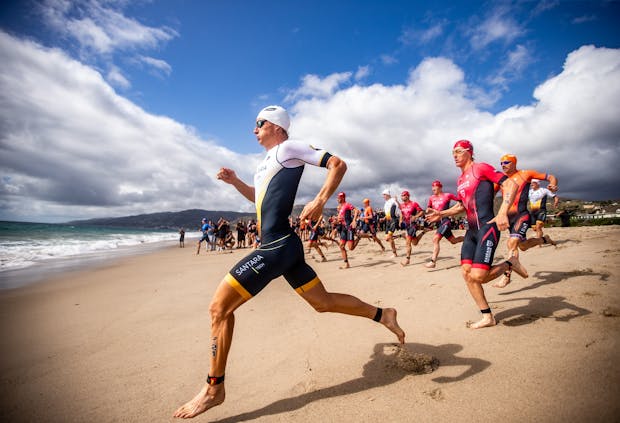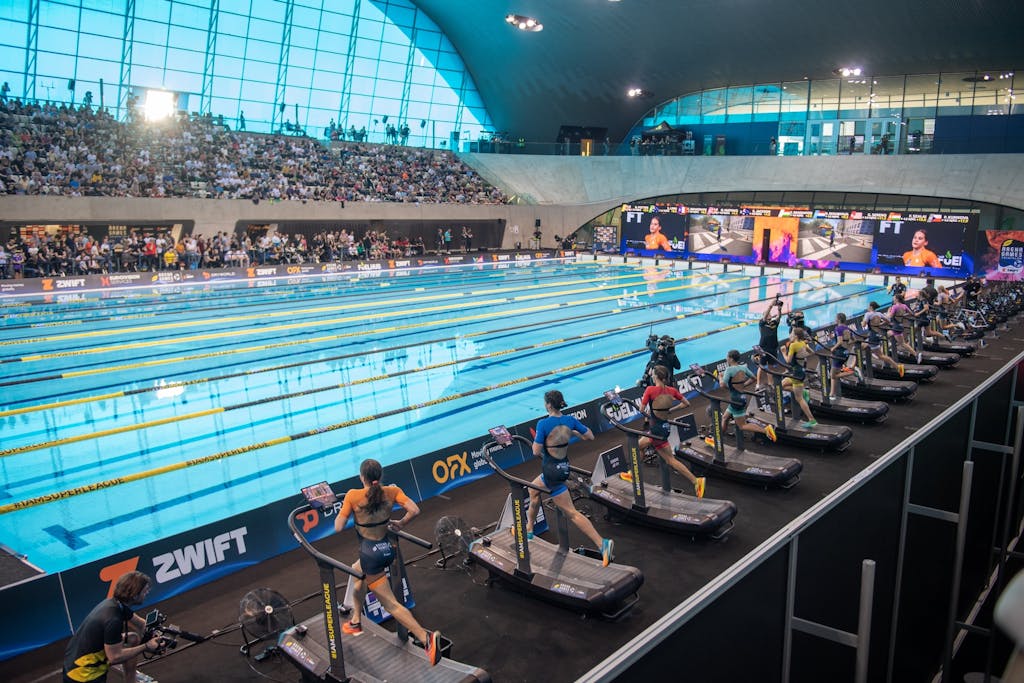
Super League Triathlon CEO Michael D’hulst, who co-founded the game-changing event series with entrepreneur Leonid Boguslavsky and four-time triathlon World Champion Chris McCormack, says: “What started as a passion for three triathlon fanatics has driven rapid change through its focus on innovation and audiences.”
Despite the unforeseen impact of Covid-19 and economic volatility, D’hulst says “Super League Triathlon has established itself as a serious force across professional events, esports and mass participation. With our new brand, SuperTri, we’re ready to take our proposition to the next level and are now actively looking for partners.”
A new chapter
SLT, which will be relaunched as SuperTri in January 2024, was initially set up to reinvigorate the professional end of triathlon. “Our view was that triathlon had done very well as a participation sport, thanks to businesses like Ironman, but that the professional end was under-served. So, we set about elevating the sport by creating an original event format that is shorter, sharper and more dynamic.”
Dubbed the Championship Series, but with a new sub-brand to be revealed at the launch of SuperTri alongside their esports and mass participation offerings, SLT’s elite events are characterised by “consistently having the best athletes racing against each other, exciting courses, unpredictable formats and thrills & spills,” says D’hulst. “This, combined with the fact races are shorter, has worked superbly for TV. We have also made the live event experience as gripping and accessible as possible. This year’s events were held in London, Toulouse, Malibu and Neom – all easy to reach for fans.”
The topline figures show that SLT is on the right track, says D’hulst. In 2022, SLT’s four elite events attracted 51m viewers across 20+ broadcast partners in 200 markets. “The data is still coming in for 2023’s Championship Series, but live viewership suggests a big uptick in key markets such as Europe (+25%). We’re also enjoying considerable growth in the Middle East. We produced Arabic language commentary for the first time in 2023 to help grow the sport in the region.”
Continuous innovation
The Covid-19 pandemic might have dented SLT’s prospects, but D’hulst says the founders turned it to their advantage: “Covid was a real challenge for everyone in the event business, but I believe we came out a lot stronger. We honed the Championship Series and developed our esports-based Arena Games in partnership with World Triathlon and Zwift. That innovation won multiple awards and connected us with a new fanbase. For the latest season, we have seen a 17% uptick in unique viewership.”

The Arena Games has led to some interesting conversations with the IOC, says D’hulst, “about the potential to develop the format for future Olympics events.” It has also demonstrated SLT’s ability to innovate in partnership with existing stakeholders. World Triathlon president and IOC member, Marisol Casado, says the partnership “proves that we are investing in new formats and events that attract both fans and athletes. We are looking forward to expanding the format, with more events, venues and athletes that will enjoy these engaging and thrilling races.”
Crucially, SLT’s new formats have also secured buy-in from top stars “The success of any sports event hinges on its athletes,” says D’hulst. “We listen to our athletes, to make sure our events fit into their wider ambitions – to compete in the Olympics, for example. We also offer an attractive $1.24m prize pool and put a lot of effort into building their social media presence.”
The combined impact of Covid-19 and the cost-of-living crisis taught the SLT’s founders the importance of agility and adaptability, reflects D’hulst. “Five years ago, we had an aspiration to be more global. But one thing I’ve learned from the last few years is the importance of being strong in key regions first. So we focused on Europe, and now we’re expanding rapidly into North America and the Middle East.”
A holistic approach
The other key learning has been the importance of thinking beyond the elite end of the sport. “Providing thrilling and innovative events for pro athletes is still a key part of our DNA,” says D’hulst, “but after our experience with the Arena Games, we decided to double down on esports and mass-participation as well. Now, we are really committed to this three-pronged approach. We are the only triathlon organisation to offer these multiple entry points to the sport and we view that as a key differentiator.”
The three-pronged strategy has seen SLT take control of mass participation events in the US, including the prestigious Chicago and New York Triathlons. Combined with SLT’s existing Malibu-based event, SLT has now established a robust position in the world’s biggest triathlon market. It has also drafted in Scott Nilson from Spartan to be SLT’s first US general manager. “The result of our recent innovations and acquisitions is that we now have multiple touchpoints across triathlon,” says D’hulst, “each of which can support and amplify the others. From the perspective of securing new commercial partners, we are in the unique position of being able to deliver brands access to the entire sport.”
Evolving the brand
The growing momentum of SLT’s Championship Series, combined with the addition of esports and mass participation capabilities, is what inspired D’hulst and his partners to give SLT’s brand a makeover.
Picking up the story, SLT’s chief commercial and marketing officer Jo Sinclair says “We needed a brand name that captured how SLT has broken the mould in triathlon. SLT is disruptive, innovative and dynamic and targets a younger and more diverse demographic than the traditional triathlon fanbase. It demands a bold, confident and global brand that appeals to men and women and differentiates us from other sports where “Super League” is commonly referred to.
The end result is SuperTri, says Sinclair. “It’s a brand identity and name that we can take full ownership of. We’ve developed a system to allow us to use it both as an umbrella brand and across our three core products: professional and elite events, esports and mass participation. We’ll be providing more details about our sub-brands at a launch event in London in January 2024.”
Forging new partnerships
The new SuperTri brand will play a key role in a focused drive for commercial partners, says Sinclair, the first time that SLT has proactively pursued the sponsorship market. “We have developed some strong and innovative partnerships in our first six years, including ASICS, Zwift, Garmin, Humango and Fuel Hub. Our investors have also given us time to perfect the brand and build a track record. Despite Covid, we have delivered around 30 events in iconic locations worldwide. Now we can go out to potential partners with a proven concept, a multi-tiered proposition and a dynamic, future-proofed brand, which has a significant and demonstrable global audience across many different platforms.”
Drilling down into why SuperTri will be attractive to sponsors, she says “there’s a general recognition that triathlon has an extremely engaged and affluent audience. But we have invented a short, adrenaline-fueled, media-first format that goes further, by bringing in a modern audience with contemporary values. We attract the best athletes and embody gender equality – with women and men racing the same format, receiving the same coverage and equal prize money.”
In addition, she says, “we manage our entire ecosystem from events to media to athletes. That gives us a lot of flexibility to create collaborative and bespoke partnerships in an uncluttered environment, so there’s a rare opportunity to own this space at a time of rapid growth.”
In terms of suitable partners Sinclair says “we are excited to be exploring title sponsorships across our entire event portfolio. But we are focusing on brands that are aligned with us – disruptors with a strong sense of social purpose and a desire to target younger demographics. Ultimately, we want to work with like-minded partners that share our passion and want to be part of reshaping an entire sport
Future partners could do worse than ask existing sponsors why they joined forces with SLT. ASICS, for example, became an official partner for both Arena Games Triathlon and the Championship Series in 2023. Citing triathlon as a growth area for the brand, Andreas Moll, ASICS Running Category Director, called SLT an “innovative” partner. “Many of our elite athletes race at their events, and we’re looking forward to seeing the collaboration evolve and connecting with more triathletes across the globe.”
Looking to the future
For D’hulst, the launch of the SuperTri brand is a statement of intent that shows SLT is primed for further expansion and innovation. “One of our primary considerations is to ensure our calendar of events fits in with the needs of elite athletes as they approach landmarks like Paris 2024 and Los Angeles 2028. But we absolutely see scope for growth. Right now our professional events are focused on the autumn, but I could see us expanding to launch a spring season across our core regions very soon.”
Storytelling is a key dimension of SLT’s success and continued emphasis is being placed on developing the profile of top talent, adds Sinclair. “We already have 23.5m fans across social media channels and we are currently building a new website in partnership with We Are Sweet. Because we have kept all of our content creation capabilities in-house, we are well positioned to grow the fame of our athletes, events and partners.”
D’hulst talks about the importance of building “a layer cake of stories”. With this in mind, SLT is also elevating the team component of its professional events. “The elite events are primarily about individual achievement but we have been carefully evolving a team dimension,” he explains. “That has proved popular with athletes and media partners, so we have started selling team franchises to add an intriguing new narrative. These will be strictly limited in number to ensure quality control.”
D’hulst also believes SLT is uniquely placed to work with other key players within the triathlon family. “There’s a lot of compatibility between what we do and what Ironman does, for example, because we run different kinds of events. So we are talking about the potential for collaboration. I also think the nature of our format makes it attractive for younger talent – because it is shorter, more social and adrenaline-based.”
Creating pathways for young talent is a key way SLT aims to help triathlon retain relevance. The team franchises, for example, will each include U21 teams – and there is also talk of creating an academy, in partnership with a leading brand: “Over time, I believe the SuperTri proposition will introduce a lot of new talent to triathlon,” says D’hulst, “and that is great news for the long-term health of the sport we love.”